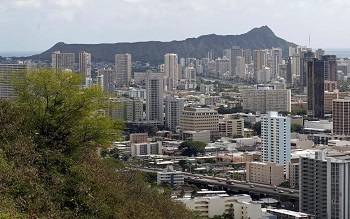The state of Hawaii has said in a court motion that it plans to seek a temporary restraining order on Wednesday against President Donald Trump's new executive order restricting travel from six Muslim-majority countries.
The Trump administration this week issued the revised immigration order replacing an earlier, more-sweeping one which had been blocked in court.
The new measure prevents citizens of Syria, Iran, Libya, Somalia, Sudan and Yemen from obtaining US visas for at least 90 days. It also suspends the refugee resettlement process for 120 days.
The federal judge who blocked the first ban was persuaded by the argument of two state attorneys general that it was causing "irreparable harm".
It is less clear those arguments would prevail the next time around.
"We are carefully reviewing the new executive order to determine its impacts on Washington state and our next legal steps," Washington state Attorney General Bob Ferguson said Monday.
Immigration advocates said the new ban still discriminated against Muslims and failed to address some of their concerns with the previous directive.
Noor Zafar, an attorney with expertise in abusive immigration practices at the Centre for Constitutional Rights, New York, said the new executive order "is still a ban designed to keep Muslims out of this country".
"The Trump administration tweaked the language to take out some of the most blatantly unconstitutional provisions such as the provision barring greencard holders," she said.
"The discrimination and the anti-Muslim bias is still there and that's evident by statements President Trump and officials from his administration have have made."
Camille Mackler, director of legal initiatives at the New York Immigration Coalition, called Trump's new order a "backdoor Muslim ban."
"We still think it's as problematic as the first travel ban," she said.
"It didn't happen in a vacuum, it happened within the context of the comments that have been made before and since the election, this sort of broader war on immigrants that the Trump administration is fighting."
The next wave of legal challenges will have to directly confront the question of whether the immigration order constitutes a Muslim ban, an issue that the courts have so far set aside.
"While the White House may have made changes to the ban, the intent to discriminate against Muslims remains," said New York Attorney General Eric Schneiderman.
Omar Jadwat, director of the ACLU's Immigrant Rights Project, said Trump "has recommitted himself to religious discrimination, and he can expect continued disapproval from both the courts and the people".
Legal experts said it would, however, be harder to challenge because it affects fewer people living in the United States and allows more exemptions to protect them.
"The clear intent is to convince the courts that the ban is the result of careful deliberation rather than religious animus," said Elizabeth Goitein, co-director of the Brennan Center for Justice's Liberty and National Security Program.
"But the tactical tweaks in this latest edition cannot rescue the order's constitutionality," she said.
"Underneath the softened rhetoric and other adjustments lies the same poisonous policy: an effort to restrict Muslims' entry into the US."
PHOTO CAPTION
A view of Honolulu, Hawaii is seen from the National Memorial Cemetery of the Pacific November 9, 2011. REUTERS
Al-Jazeera


 Home
Home Discover Islam
Discover Islam Quran Recitations
Quran Recitations Lectures
Lectures
 Fatwa
Fatwa Articles
Articles Fiqh
Fiqh E-Books
E-Books Boys & Girls
Boys & Girls  Articles
Articles










